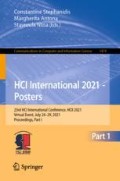Abstract
We tackle the digital divide issue from the user experience point of view. Our study aim at obtaining information on the impact of UI/UX design choices on the participants’ achievement strategies. In that prospect, we asked voluntary participants receiving social benefits at a social action center to perform typical account management tasks on two French administration websites. Then we analyzed their visual exploration strategies.
The results of this preliminary study suggest that highly symbolic pictographic representations are ignored by users in a situation of digital precariousness. They spend a large amount of time looking through the textual content to find indications, submenus or links to navigate rather than exploiting the shorthand access provided through the abstract icon system. These ergonomic choices constitute an additional barrier to the use of these technologies by fragile users.
Access this chapter
Tax calculation will be finalised at checkout
Purchases are for personal use only
References
Punagin, S., Arya, A.: Privacy in the age of pervasive internet and big data analytics challenges and opportunities. IJMECS 7, 36–47 (2015)
Eshet-Alkalai, Y.: Digital literacy: a conceptual framework for survival skills in the digital era. J. Educ. Multimed. Hypermed. 13(1), 93–106 (2004)
Peña-López, I.: Falling through the net: Defining the digital divide (1999)
Hargittai, E.: Second-level digital divide: mapping differences in people’s online skills. arXiv preprint cs/0109068 (2001)
Gilster, P., Glister, P.: Digital Literacy. Wiley Computer Pub, New York (1997)
Gallardo-Echenique, E.E., de Oliveira, J.M., Marqués-Molias, L., Esteve-Mon, F.: Digital competence in the knowledge. Society 11, 17 (2015)
Wheeler, S.: Digital literacies for engagement in emerging online cultures, vol. 12 (2012)
Eshet, Y.: Digital literacy: a conceptual framework for survival skills in the digital era. J. Educ. Multimed. Hypermed. 13, 93–106 (2004)
Peters, M.A., Araya, D.: Transforming American Education: Learning Powered by Technology. SAGE Publications Sage UK, London (2011)
Ng, W.: Can we teach digital natives digital literacy? Comput. Educ. 59, 1065–1078 (2012). https://doi.org/10.1016/j.compedu.2012.04.016
Gillen, J.: Digital Literacies. Routledge (2014)
Prensky, M.: Digital natives, digital immigrants part 2: do they really think differently? On the horizon. (2001)
Legleye, S., Rolland, A.: Une personne sur six n’utilise pas Internet, plus d’un usager sur trois manque de compétences numériques de base (2019). https://www.insee.fr/fr/statistiques/4241397
Lapshin, I.: Digital resocialization of elderly people. In: Proceedings of the International Conference on Contemporary Education, Social Sciences and Ecological Studies (CESSES 2018). Atlantis Press, Moscow, Russia (2018). https://doi.org/10.2991/cesses-18.2018.217
Scheerder, A., van Deursen, A., van Dijk, J.: Determinants of Internet skills, uses and outcomes. A systematic review of the second- and third-level digital divide. Telemat. Inform. 34, 1607–1624 (2017). https://doi.org/10.1016/j.tele.2017.07.007
Castilla, D., et al.: Teaching digital literacy skills to the elderly using a social network with linear navigation: a case study in a rural area. Int. J. Hum Comput Stud. 118, 24–37 (2018). https://doi.org/10.1016/j.ijhcs.2018.05.009
Bienvenue sur Caf.fr. http://www.caf.fr/
https://www.pole-emploi.fr/, https://www.pole-emploi.fr/accueil/
UNESCO Institute for: International standard classification of education: ISCED 2011. UNESCO Institute for Statistics Montreal (2012)
TEA - Measurement and analysis of Human Behavior. https://www.teaergo.com/. Accessed 17 Mar 2021
Romero, R., Díez, D., Montero, S., Díaz, P., Aedo, I.: Towards a Systematic Development of RIAs: Taxonomy for classifying Rich-User-Interface Components, vol. 14 (2011)
Kim, J.H., Lee, K.P.: Cultural difference and mobile phone interface design: icon recognition according to level of abstraction. In: Proceedings of the 7th International Conference on Human Computer Interaction with Mobile Devices & Services, pp. 307–310 (2005)
Author information
Authors and Affiliations
Corresponding author
Editor information
Editors and Affiliations
Rights and permissions
Copyright information
© 2021 Springer Nature Switzerland AG
About this paper
Cite this paper
Capobianco, A., Chibout, K., Kontiebo, P., Cazier, D. (2021). Using Abstract Icon Systems in the Digital Divide Era: Are Users Icon Blind?. In: Stephanidis, C., Antona, M., Ntoa, S. (eds) HCI International 2021 - Posters. HCII 2021. Communications in Computer and Information Science, vol 1419. Springer, Cham. https://doi.org/10.1007/978-3-030-78635-9_15
Download citation
DOI: https://doi.org/10.1007/978-3-030-78635-9_15
Published:
Publisher Name: Springer, Cham
Print ISBN: 978-3-030-78634-2
Online ISBN: 978-3-030-78635-9
eBook Packages: Computer ScienceComputer Science (R0)

